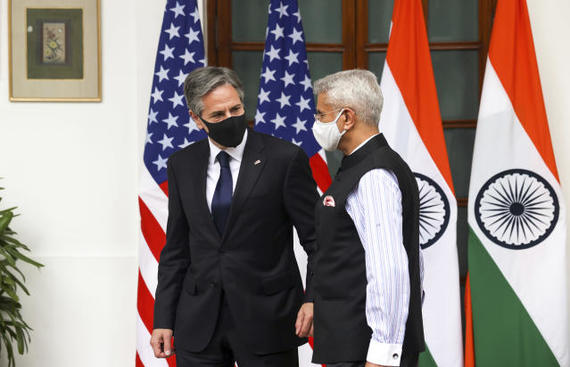US & India pledge to expand multilateral security partnership

India’s top diplomats and the United States come in terms to expand their multilateral security partnership. This move would intensify the ties between two countries that are concerned over China’s growing influence in the region.
U.S. Secretary of State Antony Blinken and Indian Foreign Minister Subrahmanyam Jaishankar met in New Delhi and sought to fortify a regional front against Beijing’s fierceness in the Indo-Pacific and their cooperation in Afghanistan.
Alongside, they also lauded each country’s help in battling Covid and said their vaccine partnership is an effort to end the pandemic.
In a joint news conference, Blinken said, “There are few relationships in the world that are more vital than one between the U.S. and India. We are the world’s two leading democracies and our diversity fuels our national strength.”
Washington has made no secret of the U.S. desire for India’s help in isolating China. The two countries have steadily ramped up their military relationship and signed a string of defense deals.
The U.S. and India are part of the Quad regional alliance that also includes Japan and Australia and focuses on China’s growing economic and military strength. China has called the Quad an attempt to contain its ambitions.
Blinken’s India visit comes just days after the No. 2 U.S. diplomat, Wendy Sherman, was in China. He was to meet Indian Prime Minister Narendra Modi later Wednesday.
Blinken announced that he and Jaishankar also spoke over regional security issues including Afghanistan, where the U.S. is expected to complete its military withdrawal in August. He called India’s contribution to the stability of Afghanistan “vital.”
Blinken said there was no “military solution” to the conflict in Afghanistan and that the country would turn into a “pariah state” if the Taliban takes control by force.
Blinken further adds, “We will continue to work together to sustain the gains of the Afghan people and support regional stability after the withdrawal of coalition forces from the country.”
Before meeting with Jaishankar, Blinken spoke to civil society leaders and said fundamental freedoms and rule of law are “tenets of democracies” like the U.S. and India.
India routinely denies criticism of its human rights record. It has also rejected criticism by foreign governments and rights groups that civil liberties have contracted in the country.
He also states, “We believe that all people deserve to have a voice in their government, to be treated with respect, no matter who they are.”
